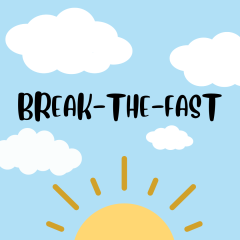BREAK-the-FAST
Often clients skip breakfast. Either they are not hungry in the morning or they are restrictive dieting such as doing intermittent fasting. They complain when they do eat breakfast, they are hungrier throughout the day.
They are correct! Our bodies are hungrier throughout the day when we eat breakfast. Eating breakfast "breaks-the-fast" and triggers our hunger signals to help us eat on time. And when we eat on time, our bodies can self-regulate to eat just the right amounts for us.
Typically, we are not hungry when we first wake up in the morning. But, it is eating within two hours of waking that starts our engine. It gets our metabolism started and running.
Intermittent Fasting (IF) or Time Restricted Eating (TRE), two types of restrictive dieting, can make our bodies overly hungry and eating can become uncontrollable. The best time to refrain from eating is after having a post-dinner snack, throughout our sleeping hours, and the three or four hours between meals and snacks. This allows our bodies to digest our food and slows the production of insulin, a hormone that prompts the body to store fat.
Restrictive dieting is unsustainable and ultimately our bodies become insatiable, resulting in overindulgence, increased insulin production, and weight gain.
For those who cannot stomach much in the morning, try our Ricotta Toast with Berries to help you break-the-fast. It’s a light, delicious, and nutritious way to start your day. The recipe can be found in our Recipes under Vegetarian. 🍓
*Studies on IF and TRE are preliminary and short in duration. More research needs to be done.
